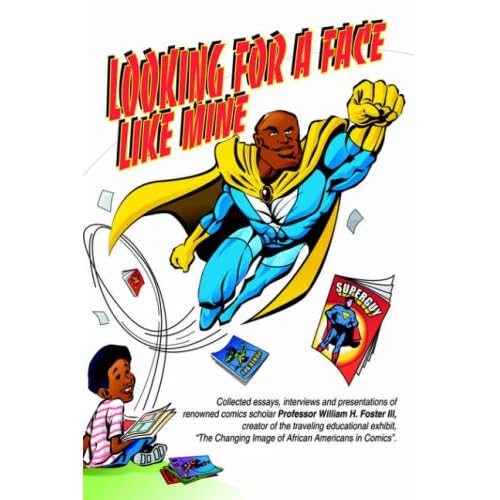I am entering into this semester long project of studying black superheroes in the '90s for a number of reasons. As someone who has from the time I could read been a fan of superhero comics and someone who over the past couple years has become very interested in race in general and in the field of Black Studies in particular, I thought this would be a perfect opportunity to study the intersection of my interests. I think that the superhero genre, through various media (comics, cartoons, movies), has been and has the potential to be a very popular genre--the success of the Dark Knight this past summer has taught us this, if anything--and that as such it's particularly important to know what racial make up of superhero stories and the ways in which race is portrayed. I want to do a study of black subjectivity in superhero stories in general and in particular the subjectivity of black superheroes. Do white creators like Todd MacFarlane write black superheroes differently from black ones like Dwayne McDuffie? What are fan reactions, across racial lines, to these black superheroes? What are some of the links between African American literature and African American superhero stories? What are the differences between comics written for overtly political purposes like those from Ania and comics like those from Milestone that are first and foremost supposed to be good stories? What are the relationships between black superhero stories and the legacy of minstrelsy? So on and so forth. As you can see, there's a lot to think about.
While I am of the opinion that we need more superheroes from Third World backgrounds, I'm particularly encouraged by that every time I've mentioned this project to one of my peers, they ask me if I'm doing anything about the Green Lantern. As most of my audience will know, Dwayne McDuffie--one of the founding fathers of the black comic company Milestone--has been involved in the past decade the animated series Justice League which has popularized the DC superhero John Stewart--one of the many who have been the Green Lantern and the only one of them who was black. I'm incredibly encouraged that in the zeitgeist the man who is the Green Lantern is an African American. As comic book scholar Bill Foster has stated: "I am very optimistic about the variety of characters of color in today's mainstream comic books. We can do better, but we could have done a lot worse." (pg 24 in
Looking For A Face Like Mine) I am also in agreement with Dwayne McDuffie that it doesn't work to have a single superhero from a particularly group of people, because of being an individual who represents one aspect of incredibly complex human experience, s/he ends up having to rep her or his whole group. (article available at
http://www.dwaynemcduffie.com --follow the link under heading More About Milestone)
I have narrowed my area of study to the 90s for a number of reasons. First of all the explosion in the comic book market in 90s culminating in the regretable speculative bubble lead to the emergence of a lot of smaller publishers like Milestone and Image creating a lot of material to sift through. I am particularly interested in Milestone because it is to my knowledge the only instance of a comic book company founded by blacks and controlled by blacks producing a line of comics largely about blacks fairly successfully. The 90s also have the advantage of being recent enough that books are still largely affordable and accessible from Internet vendors and being long enough ago that some scholarly literature has been produced. It was also before companies cut out the letters page which I think can provide some interesting source material for my research. I'm really excited about letters pages.
SO, here are the comics, movies, and cartoons I plan on looking at. I want your help finding more good stuff for me to read or watch:
COMICS
DC Comics:
- Green Lantern: Mosaic
- Steel
Milestone Media:
- Hardware
- Static
- Icon
- Blood Syndicate
Milestone/DC crossover:
- World's Collide
Marvel Comics:
- Captain Confederacy
- Cage
- Heroes for Hire
Image:
- Spawn
- Amanda & Gunn
Millenium:
- Nanosoup
- ???
Ania:
- Purge
- Heru, Son of ???
- ???
MOVIES
- Meteor Man
- Steel
- Spawn
- Blade
- Demolition Man
CARTOONS
- Static Shock (yes, I know it's from this decade)
- that one episode of the Superman Cartoon with Steel in it
Any ideas?


